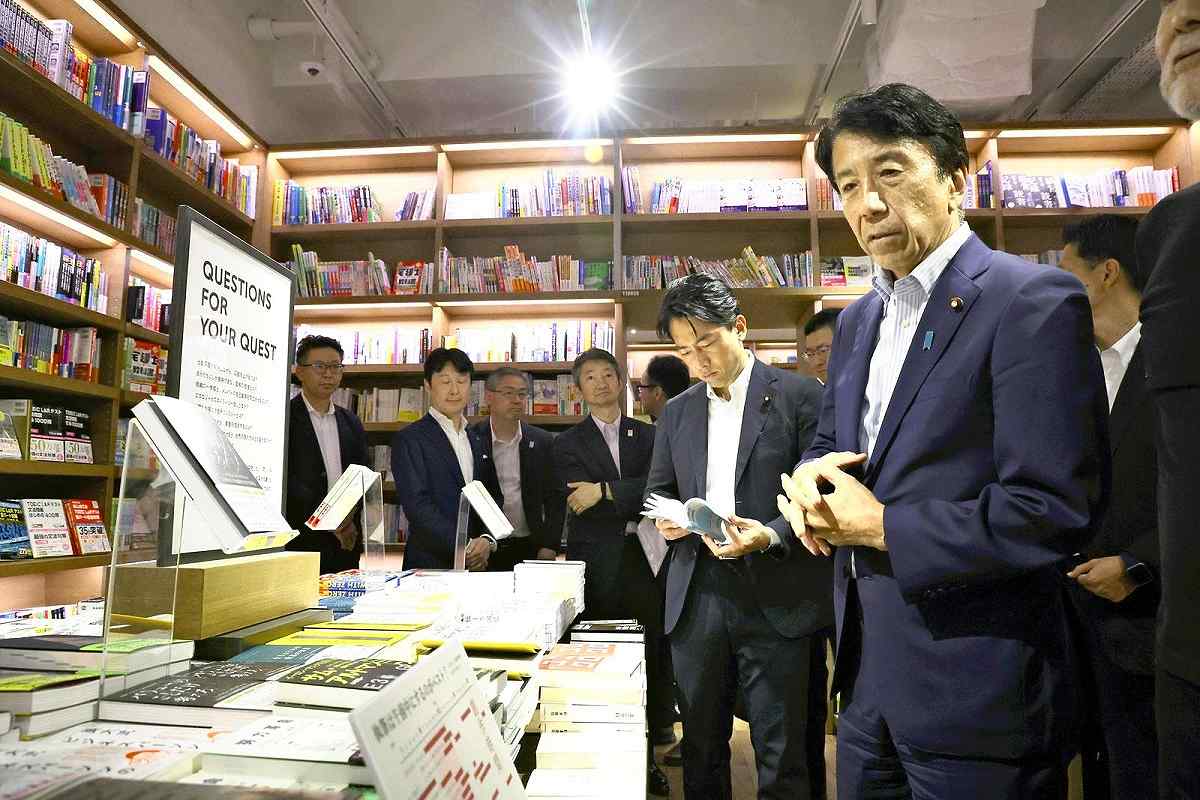Breathing New Life into Bookstores; Public and Private Sectors Working to Save Ailing Industry

Economy, Trade and Industry Minister Ken Saito, right, and other officials look at some of the books on offer at a bookstore in Shibuya Ward, Tokyo, on Tuesday.
6:00 JST, July 27, 2024
About four months have passed since the government opened a new chapter in its efforts to support and revive bookstores, but it remains unclear whether this story will have a happy ending.
The Economy, Trade and Industry Ministry has established a project team for bookstore promotion under the direct supervision of the ministry’s head. While there is a growing awareness that bookstores are important cultural centers, many stores across Japan are facing financial difficulties and closing their doors as sales of books and magazines remain in the doldrums.
At a forum on print culture and reviving bookstores organized by The Bunka News on Thursday, Economy, Trade and Industry Minister Ken Saito expressed his determination to support these businesses. “Many young people don’t realize how wonderful bookstores are, and young people who buy what they want just by going online will account for much of the population,” Saito said. “I want to promote support for these stores before they become an endangered species.”
Toshikazu Yamaguchi, president of the Characters Culture Promotion Organization public interest incorporated foundation and president of The Yomiuri Shimbun Holdings, also spoke at the forum. “Bookstores in regional communities and bookstores in urban areas with soaring rents are facing an increasingly tight squeeze. The nation must deal with this issue as it unfolds,” Yamaguchi said.
According to the Japan Publishing Organization for Information Infrastructure Development, 15,602 bookstores were in business across Japan in fiscal 2013, but this figure had plunged to 10,918 stores in fiscal 2023.
Brick-and-mortar stores have been struggling with factors such as books providing only a small profit margin, the increase in prominence of online stores and a shortage of bookstore business successors. One-fourth of all municipalities across Japan currently do not have a single bookstore. As concerns have mounted that leaving the situation unaddressed could “deprive people of opportunities to come into contact with the written word,” the project team was launched to devise ways to promote and maintain these hubs of knowledge.
The Basic Policy on Economic and Fiscal Management and Reform, which was approved by the Cabinet in June, also called for measures to revitalize bookstores and promote written and printed culture, including books.
Inventory search experiment
The publishing industry and bookstores themselves have initiated efforts to raise the number of profitable stores and increase their convenience for customers.
Kinokuniya Co., Culture Convenience Club Co., which operates the Tsutaya bookstore chain, and major book wholesaler Nippon Shuppan Hanbai Inc. have jointly established Booksellers & Co. It will create channels that allow bookstores to proactively procure books they want to have on their shelves, and aim to boost book stores’ profit margin to 30% of book sales from about 20%.
Elsewhere, the Japan Publishing Industry Foundation for Culture (JPIC), an organization formed by publishers, bookstores and book wholesalers, has been instrumental in a proof-of-concept test of a bookstore stock cross-search system that began in June.
Customers who are unable to find a book they need at a store are not easily able to discern whether nearby stores have that book in stock, so they often look online to make their purchase instead. The current trial enables customers to use their smartphone or other devices to cross-check whether stores have certain books in stock. Major bookstore chains Book1st Corp. and Books Ogaki Co. are among the participants in this trial, which is scheduled to run for two years.
“We would like to ask other stores to participate, too,” a JPIC official told The Yomiuri Shimbun.
Stores’ heavy burden
The Research Institute for Publications announced Thursday that estimated sales of publications, including print and electronic, in the first half of 2024 slipped 1.5% from the same period last year to ¥790.2 billion. For print publications alone, the figure dropped 5.0% to ¥520.5 billion. The decline was especially marked for magazines, which had previously been a major pillar of support for bookstore businesses.
Fees for cashless payments are also among the factors weighing on bookstores in recent years. The president of the company operating the Konno Shoten bookstore in Suginami Ward, Tokyo, wants additional support for businesses such as his.
“There are readers who want to see bookshelves with their own eyes and to buy books,” he said. “Bookstores are grappling with soaring personnel costs and other expenses, so the business structure itself can’t continue operating like this. I want the government to consider additional support measures.”
Top Articles in Society
-

Producer Behind Pop Group XG Arrested for Cocaine Possession
-

Man Infected with Measles Reportedly Dined at Restaurant in Tokyo Station
-

Man Infected with Measles May Have Come in Contact with Many People in Tokyo, Went to Store, Restaurant Around When Symptoms Emerged
-

Woman with Measles Visited Hospital in Tokyo Multiple Times Before Being Diagnosed with Disease
-

Australian Woman Dies After Mishap on Ski Lift in Nagano Prefecture
JN ACCESS RANKING
-

Producer Behind Pop Group XG Arrested for Cocaine Possession
-

Japan PM Takaichi’s Cabinet Resigns en Masse
-

Man Infected with Measles Reportedly Dined at Restaurant in Tokyo Station
-

Israeli Ambassador to Japan Speaks about Japan’s Role in the Reconstruction of Gaza
-

Videos Plagiarized, Reposted with False Subtitles Claiming ‘Ryukyu Belongs to China’; Anti-China False Information Also Posted in Japan
























